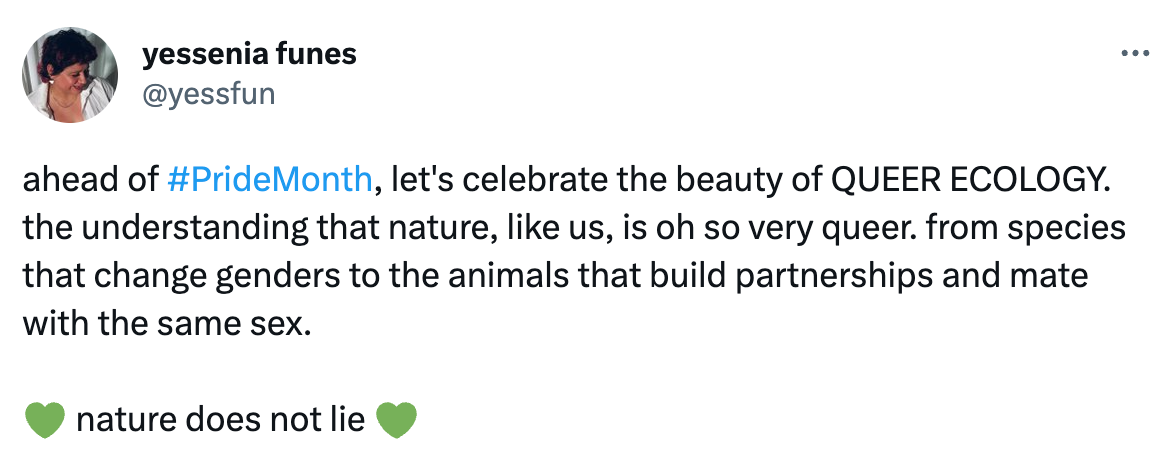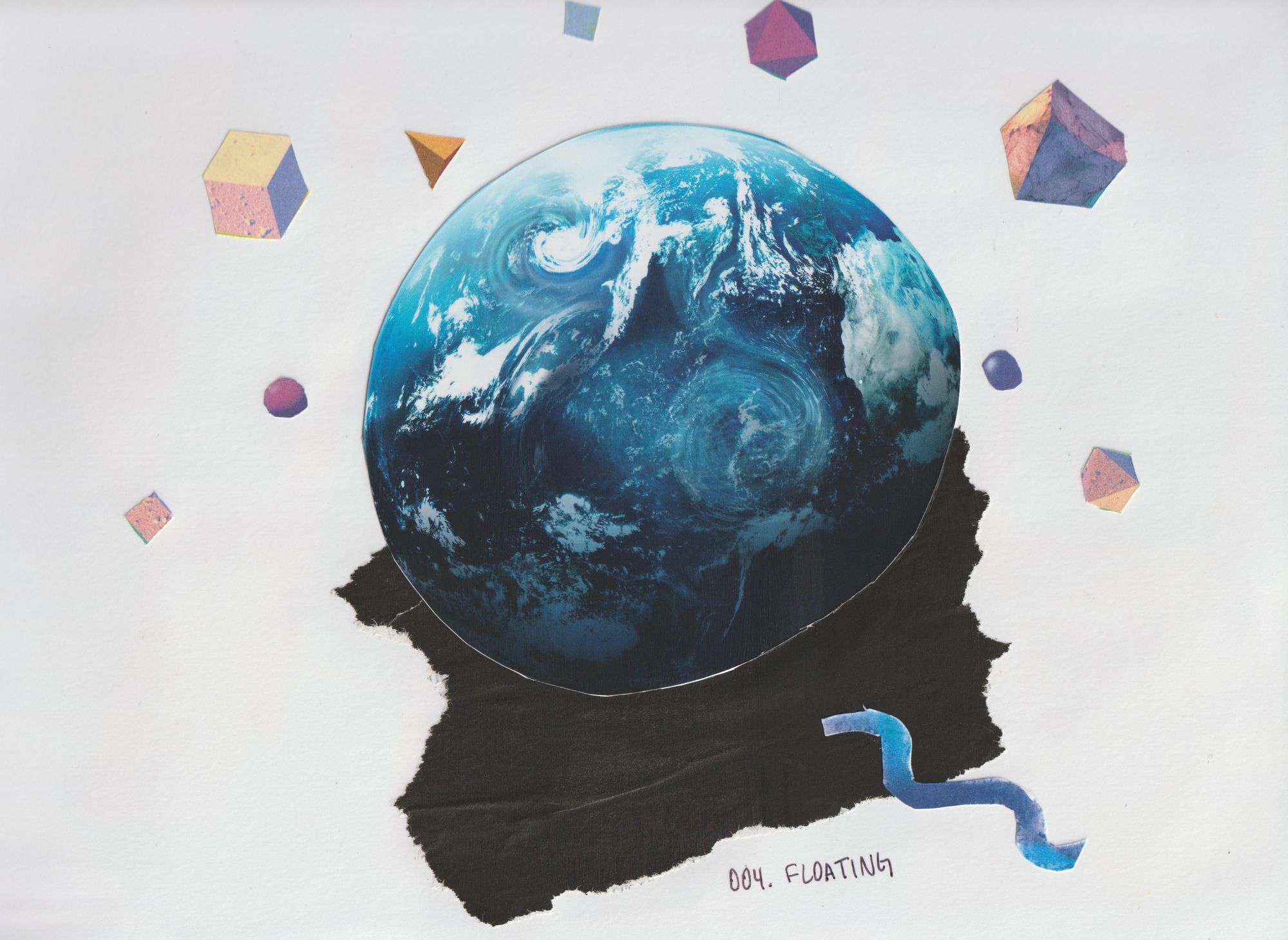Possibilities x Pride
A creative newsletter on the possibilities that lie where the climate crisis meets community

LISTENING: to this song
FEELING: grateful
SEEING: the trees swaying outside the balcony
I know, it's been a little while, hasn't it? Did you miss me? Ugh, I know I missed you. So terribly much. But I'm back. And this time, better than ever.
I quit my job at Atmos because, well, I was burnt out. I needed a solid month of recovery and rest. Plus, as proud as I was of the stories I commissioned and edited, I'm a writer first. Editing didn't bring me joy — so here I am. That's why I've ventured off on my own path. I'm still writing for Atmos as editor-at-large, but I'll be writing for lots more publications now — and for myself, of course. On here. My newsletter. Our newsletter. For you. For us.
Boy, am I pumped to be back, y'all.
Welcome to Possibilities, a creative newsletter dedicated to the possibilities that lie where the climate crisis meets community. I'm Yessenia Funes, a journalist who feels too damn much. I hope this newsletter can be a space where we can collectively feel, resist, create, and dream — together. It'll publish weekly, every Thursday. And it'll include little sensory experiences at the top: what I'm listening to, seeing, and feeling as I write. I urge you to listen to the song I embed when you read if you can.
First, let's start with some background.
I landed on the name Possibilities for a few reasons:
When I learned of the word's origins, I knew I had found my newsletter name. The climate and environmental justice movement is one of the most powerful forces out there. This newsletter (like my previous The Frontline) will continue to center issues related to climate and environmental justice and the communities most affected by the climate crisis.
Unlike The Frontline, however, this newsletter will be more diary-style where I share thoughts about stories I've published elsewhere rather than publishing stories exclusively on Possibilities (unless subscribership takes off to the point where I can afford to do that).
I have many goals for this newsletter. Here are a few:
🌀 Reshare older stories of mine that are presently relevant
🌀 Offer previews of stories and projects I'm currently working on
🌀 Include info that didn't make it into stories I published that week
🌀 Feature links to what I've been reading that week
🌀 Honor lives recently lost to the climate crisis
🌀 Share my own artistic work, including collages and poetry
🌀 Build enough revenue to independently license art and invite paid guest contributors to the newsletter
The newsletter's launch coincides with the start of Pride month. That was intentional. For those who don't know, Pride is personal over here. I'm queer (bisexual, to be exact). This identity and lived experience inform and guide my lens as a journalist, too. I wish there were more of us on the climate beat.
The intersection of climate justice and LGBTQ+ rights doesn't get nearly as much attention as it deserves.
Imagine the possibilities of a future where climate justice warriors and queer human rights defenders were to strategically come together. A future where the climate movement embraces the multitude of how we can love. Where the fight for clean air took place alongside the fight for access to gender-affirming healthcare.

The movement can learn a lot from the struggles of queer and trans folks. We illustrate the beauty and breadth of what's possible when a people dare to believe in a world that does not yet exist: a world where we can be accepted in full. Queer people exist despite the hate we face. We celebrate and radiate joy despite violent efforts to stomp it out. We draw inspiration from nature and from our hearts. Climate spaces — which have historically excluded folks like myself — could learn a thing or two.
I plan to publish at least one story this month (hopefully more!) shedding light on these connections. As more states across the U.S. take action to strip our rights, I want to share this quote from Daniella Orias, a professor of women, gender, and sexuality studies at Florida Atlantic University, for a story I wrote last year on Florida's Don't Say Gay law.
"If these queer, trans, LGBTQ youth are out there fighting for their lives and their ability to just stay above water, how are they going to be able to fight these big-topic issues like climate change?”
For now, the newsletter will remain free for all subscribers, but in a few weeks, I'll begin limiting what is visible to free members. Paid subscribers will get the full experience. Who knows, if enough people subscribe, I may just keep the newsletter open and allow the paid subscriptions to subsidize access to everyone. It depends on how it goes!
For $5 a month — or $50 a year — support an independent climate journalist chasing her dreams. 🌀
Currently Reading
I've been staying up way too late just about every night reading the "A Court of Thorns and Roses" series by Sarah J. Mass. I'm already on the third book. I know, not climate-related — but we all need an escape. And this one is so good! It came to me highly recommended by my good friend and former boss Atmos EIC Willow Defebaugh.
This story by Siri Chilukuri at Grist where she interviews drag queen Pattie Gonia reminds us how awful the conservative Christian right can be.
Justine Calma at The Verge dives deep into the importance of internet infrastructure during disaster — and the shortcomings when a Brooklyn neighborhood tried to build its own network after Superstorm Sandy.
I'm a huge nerd for data journalism. This piece published last month by a star team at The Washington Post lays out all the different minerals electric vehicles require — and the communities in the Global South these minerals put at risk. Another reminder of why mass transit is king.
What lessons can we learn from the plants resilient enough to survive the world's worst mass extinction event? Corinne Purtill at The Los Angeles Times takes a look.
On the global plastics treaty being negotiated later this month: "What I call home is more ocean than it is land, and this ocean is our livelihood."
Collage

The Earth floats, surrounded by floating trash. In darkness. In space. With us inside. We, too, float. Toward our dreams, our fears, our own endless dark.
Rest in Power
While we can't say for certain that climate change led to these specific weather events (we need attribution studies for that), we do know that the Earth's rising temperatures are already creating more disasters like these.
A child is dead after floods in Algeria last week. Dozens more people were rescued after being trapped. Floods in Sierra Leone killed at least seven people earlier this month. The continent of Africa is among the most vulnerable to the climate crisis. We in the West rarely pause to mourn the lives — the families — torn apart in this part of the globe. That needs to change.
Two weeks ago, the season's most powerful Pacific cyclone so far barrelled into Myanmar and Bangladesh. Cyclone Mocha killed at least six people and injured some 700 others. The death toll could've been much worse had leaders been slower to evacuate coastal communities.
Three weeks ago, at least 21 people in Russia died due to wildfires. Many were older people who could not flee the flames in time. (Read this story I wrote last year about how vulnerable climate change makes older people.)
Intense rainstorms killed at least 15 people in Italy earlier this month as floodwaters and landslides brought suffering to the country's northern region. Just this week, rain-induced flash floods killed another person in the country's southwest.
See you next week. xx
- Yessenia
